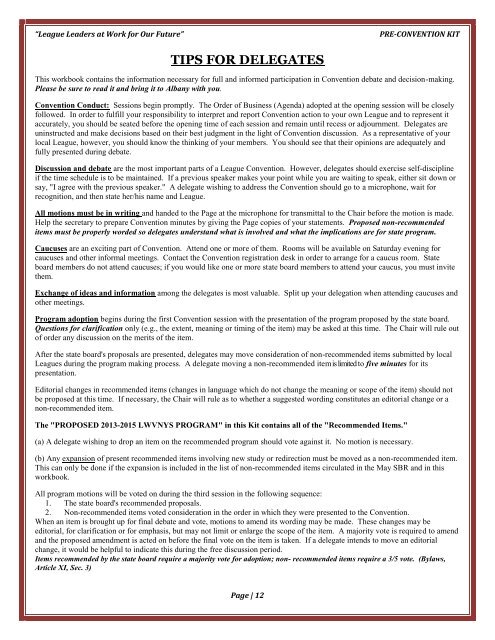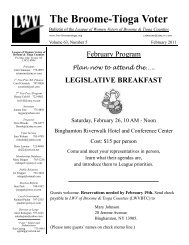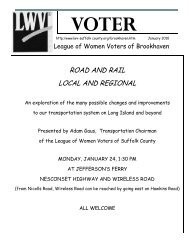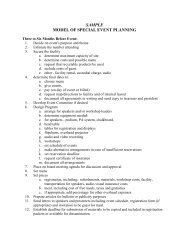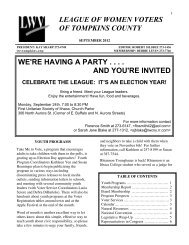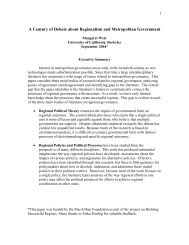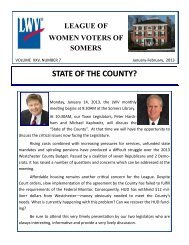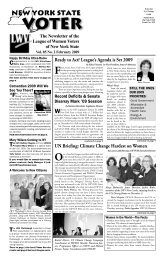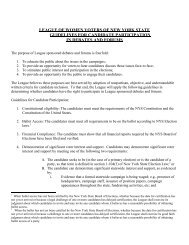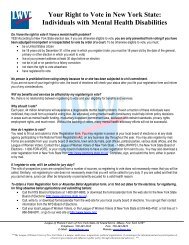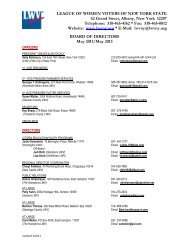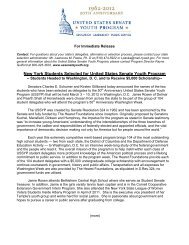Pre Convention Kit - League of Women Voters of New York State
Pre Convention Kit - League of Women Voters of New York State
Pre Convention Kit - League of Women Voters of New York State
Create successful ePaper yourself
Turn your PDF publications into a flip-book with our unique Google optimized e-Paper software.
“<strong>League</strong> Leaders at Work for Our Future” PRE-CONVENTION KIT<br />
TIPS FOR DELEGATES<br />
This workbook contains the information necessary for full and informed participation in <strong>Convention</strong> debate and decision-making.<br />
Please be sure to read it and bring it to Albany with you.<br />
<strong>Convention</strong> Conduct: Sessions begin promptly. The Order <strong>of</strong> Business (Agenda) adopted at the opening session will be closely<br />
followed. In order to fulfill your responsibility to interpret and report <strong>Convention</strong> action to your own <strong>League</strong> and to represent it<br />
accurately, you should be seated before the opening time <strong>of</strong> each session and remain until recess or adjournment. Delegates are<br />
uninstructed and make decisions based on their best judgment in the light <strong>of</strong> <strong>Convention</strong> discussion. As a representative <strong>of</strong> your<br />
local <strong>League</strong>, however, you should know the thinking <strong>of</strong> your members. You should see that their opinions are adequately and<br />
fully presented during debate.<br />
Discussion and debate are the most important parts <strong>of</strong> a <strong>League</strong> <strong>Convention</strong>. However, delegates should exercise self-discipline<br />
if the time schedule is to be maintained. If a previous speaker makes your point while you are waiting to speak, either sit down or<br />
say, "I agree with the previous speaker." A delegate wishing to address the <strong>Convention</strong> should go to a microphone, wait for<br />
recognition, and then state her/his name and <strong>League</strong>.<br />
All motions must be in writing and handed to the Page at the microphone for transmittal to the Chair before the motion is made.<br />
Help the secretary to prepare <strong>Convention</strong> minutes by giving the Page copies <strong>of</strong> your statements. Proposed non-recommended<br />
items must be properly worded so delegates understand what is involved and what the implications are for state program.<br />
Caucuses are an exciting part <strong>of</strong> <strong>Convention</strong>. Attend one or more <strong>of</strong> them. Rooms will be available on Saturday evening for<br />
caucuses and other informal meetings. Contact the <strong>Convention</strong> registration desk in order to arrange for a caucus room. <strong>State</strong><br />
board members do not attend caucuses; if you would like one or more state board members to attend your caucus, you must invite<br />
them.<br />
Exchange <strong>of</strong> ideas and information among the delegates is most valuable. Split up your delegation when attending caucuses and<br />
other meetings.<br />
Program adoption begins during the first <strong>Convention</strong> session with the presentation <strong>of</strong> the program proposed by the state board.<br />
Questions for clarification only (e.g., the extent, meaning or timing <strong>of</strong> the item) may be asked at this time. The Chair will rule out<br />
<strong>of</strong> order any discussion on the merits <strong>of</strong> the item.<br />
After the state board's proposals are presented, delegates may move consideration <strong>of</strong> non-recommended items submitted by local<br />
<strong>League</strong>s during the program making process. A delegate moving a non-recommended item is limited to five minutes for its<br />
presentation.<br />
Editorial changes in recommended items (changes in language which do not change the meaning or scope <strong>of</strong> the item) should not<br />
be proposed at this time. If necessary, the Chair will rule as to whether a suggested wording constitutes an editorial change or a<br />
non-recommended item.<br />
The "PROPOSED 2013-2015 LWVNYS PROGRAM" in this <strong>Kit</strong> contains all <strong>of</strong> the "Recommended Items."<br />
(a) A delegate wishing to drop an item on the recommended program should vote against it. No motion is necessary.<br />
(b) Any expansion <strong>of</strong> present recommended items involving new study or redirection must be moved as a non-recommended item.<br />
This can only be done if the expansion is included in the list <strong>of</strong> non-recommended items circulated in the May SBR and in this<br />
workbook.<br />
All program motions will be voted on during the third session in the following sequence:<br />
1. The state board's recommended proposals.<br />
2. Non-recommended items voted consideration in the order in which they were presented to the <strong>Convention</strong>.<br />
When an item is brought up for final debate and vote, motions to amend its wording may be made. These changes may be<br />
editorial, for clarification or for emphasis, but may not limit or enlarge the scope <strong>of</strong> the item. A majority vote is required to amend<br />
and the proposed amendment is acted on before the final vote on the item is taken. If a delegate intends to move an editorial<br />
change, it would be helpful to indicate this during the free discussion period.<br />
Items recommended by the state board require a majority vote for adoption; non- recommended items require a 3/5 vote. (Bylaws,<br />
Article XI, Sec. 3)<br />
Page | 12


